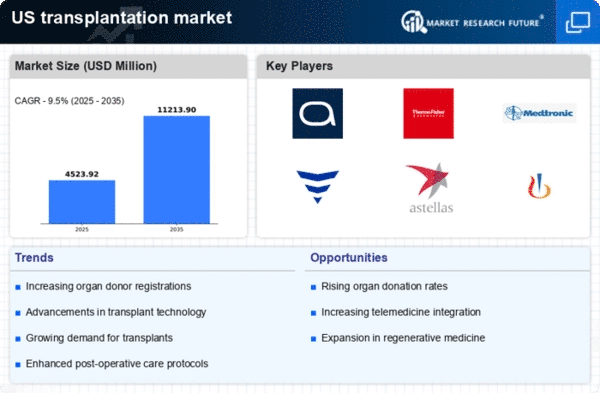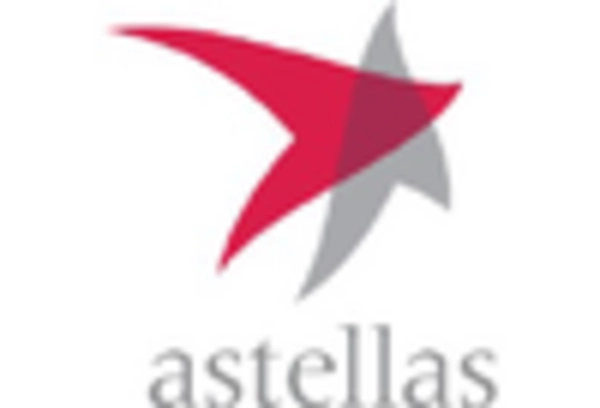Rising Incidence of Organ Failure
The increasing prevalence of chronic diseases such as diabetes and hypertension is contributing to a higher incidence of organ failure in the US. This trend is likely to drive demand within the transplantation market, as more patients require organ transplants to survive. According to recent statistics, approximately 120,000 individuals are currently on the waiting list for organ transplants, with kidney transplants being the most sought after. The growing patient population necessitates advancements in transplantation procedures and organ procurement strategies, thereby influencing the overall dynamics of the transplantation market. As the healthcare system adapts to these challenges, the market is expected to expand, potentially leading to increased investments in research and development of innovative transplant solutions.
Advancements in Surgical Techniques
Innovations in surgical techniques and technologies are transforming the landscape of the transplantation market. Minimally invasive procedures, robotic-assisted surgeries, and enhanced imaging technologies are improving patient outcomes and reducing recovery times. For instance, laparoscopic techniques are becoming more prevalent in kidney transplants, which may lead to shorter hospital stays and lower complication rates. The adoption of these advanced surgical methods is likely to attract more patients seeking transplantation, thereby expanding the market. Additionally, the integration of artificial intelligence in surgical planning and execution could further enhance the precision and success rates of transplant surgeries, indicating a promising future for the transplantation market.
Regulatory Support for Transplantation
The US government has been actively promoting policies that support organ donation and transplantation. Initiatives such as the Organ Procurement and Transplantation Network (OPTN) aim to streamline the organ allocation process and enhance the efficiency of transplantation services. This regulatory framework is likely to foster growth in the transplantation market by ensuring that more organs are available for transplantation. Furthermore, funding for research and development in transplantation technologies is being prioritized, which may lead to improved surgical techniques and post-operative care. As regulatory bodies continue to advocate for organ donation, the transplantation market could experience a surge in activity, benefiting both patients and healthcare providers.
Increased Collaboration Among Healthcare Providers
Collaboration among healthcare providers, including hospitals, transplant centers, and research institutions, is becoming increasingly vital in the transplantation market. Such partnerships facilitate knowledge sharing, resource allocation, and the development of best practices in organ transplantation. By working together, these entities can improve patient care and streamline the transplantation process, ultimately leading to better outcomes. The establishment of networks that connect various stakeholders in the transplantation ecosystem may enhance organ donation rates and optimize the use of available organs. This collaborative approach is expected to drive growth in the transplantation market, as it fosters innovation and efficiency in addressing the challenges faced by patients in need of transplants.
Growing Investment in Biologics and Regenerative Medicine
The transplantation market is witnessing a surge in investment directed towards biologics and regenerative medicine. These fields focus on developing therapies that can enhance organ function and promote healing, potentially reducing the need for transplants. For example, stem cell therapies are being explored as a means to regenerate damaged tissues and organs, which could alleviate some of the pressures on the transplantation market. As research progresses, the commercialization of these innovative therapies may provide alternative solutions for patients with organ failure, thereby reshaping the market landscape. The financial backing from both public and private sectors is likely to accelerate advancements in this area, fostering a more robust transplantation market.
















